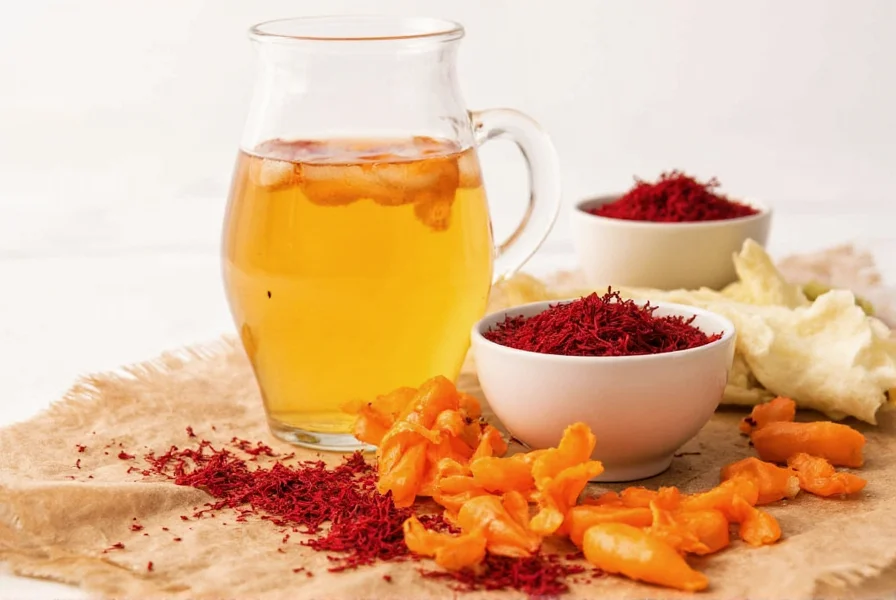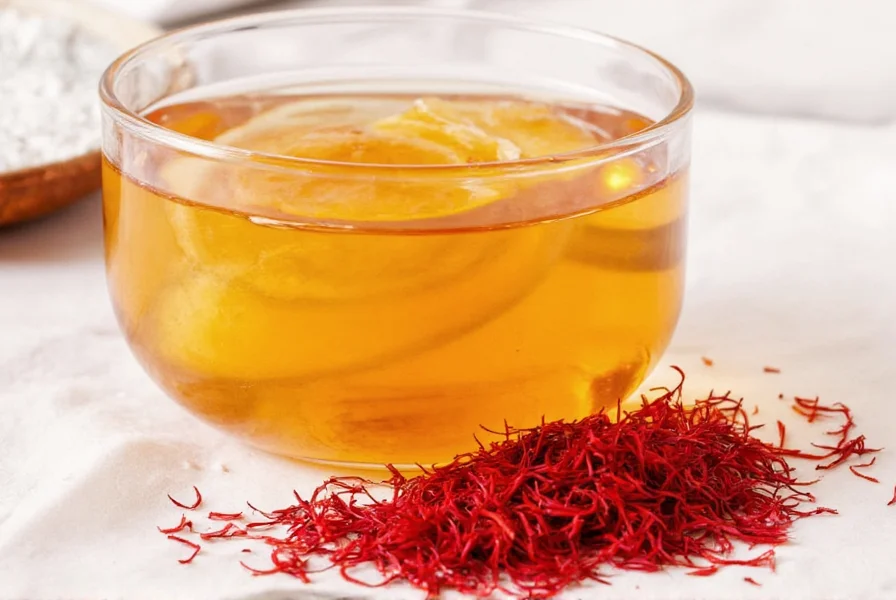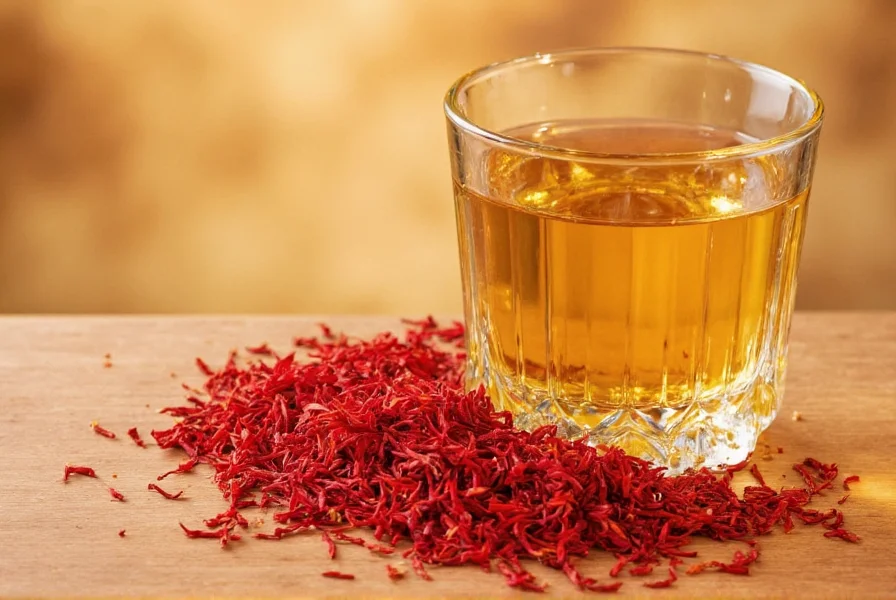Saffron water represents one of the simplest yet most versatile preparations of the world's most expensive spice. This golden infusion has been utilized across Middle Eastern, South Asian, and Mediterranean cultures not only as a culinary staple but also in traditional wellness practices. Understanding its proper preparation, potential benefits, and scientific evidence behind common claims helps separate historical tradition from contemporary understanding.
Historical Context of Saffron Water
Historical records show saffron water usage dating back to ancient Persian and Egyptian civilizations. Traditional Ayurvedic medicine incorporated saffron water for its purported cooling properties, while Persian healers used it for mood support. In Spanish and Moroccan culinary traditions, saffron water serves as the preferred method for evenly distributing saffron's distinctive flavor and color throughout dishes without wasting precious threads.
Proper Preparation of Saffron Water
Creating effective saffron water requires attention to detail. The optimal preparation method involves:
- Using 15-20 high-quality saffron threads per serving
- Crushing threads gently to increase surface area
- Steeping in 2-3 tablespoons of warm (not boiling) water
- Allowing 15-20 minutes for full infusion
- Using both the liquid and remaining threads in your recipe
This preparation method maximizes the extraction of saffron's active compounds including crocin (responsible for color), picrocrocin (for flavor), and safranal (for aroma). Many commercial products claiming to be saffron water often contain artificial coloring and minimal actual saffron, making homemade preparation preferable for authentic results.

Scientific Research on Saffron Water Benefits
Modern research has begun investigating traditional claims about saffron water. A 2022 meta-analysis published in Phytotherapy Research examined 14 clinical trials involving saffron supplementation. While most studies used saffron extracts rather than water preparations specifically, the active compounds are similar when properly prepared.
| Potential Benefit | Research Status | Key Findings |
|---|---|---|
| Mood Support | Multiple human studies | Some evidence suggests saffron compounds may affect serotonin levels; comparable to low-dose antidepressants in short-term studies |
| Antioxidant Properties | Well-established in vitro | Saffron contains potent antioxidants that may help combat oxidative stress |
| Skin Health | Limited human studies | Preliminary research shows potential anti-inflammatory effects when applied topically |
| Metabolic Support | Animal studies primarily | Insufficient human evidence for specific metabolic claims |
It's crucial to note that most research uses standardized saffron extracts rather than simple saffron water preparations. The concentration of active compounds in homemade saffron water varies significantly based on preparation method, saffron quality, and steeping time.
Saffron Water for Skin and Beauty Applications
Traditional beauty practices across South Asia and the Middle East have long incorporated saffron water for skin enhancement. When used as a facial toner, properly prepared saffron water may provide mild antioxidant benefits. Dermatologists caution that while saffron water won't cause harm for most skin types, dramatic results claimed in some beauty circles lack scientific validation.
For those interested in traditional beauty applications, a common preparation involves:
- Mixing 1 teaspoon saffron water with 2 tablespoons rose water
- Applying to clean skin with cotton pad
- Leaving on for 10-15 minutes before rinsing
Safety Considerations and Potential Side Effects
Saffron water is generally safe when consumed in culinary amounts (up to 1.5 grams daily). However, certain precautions should be observed:
- Pregnant women should avoid therapeutic amounts as high doses may stimulate uterine contractions
- Individuals taking antidepressants should consult healthcare providers due to potential interactions
- Excessive consumption (above 5 grams) can cause dizziness, nausea, and in extreme cases, more serious effects
- Those with saffron allergies (rare but possible) should avoid completely
The quality of saffron significantly impacts safety. Adulterated saffron products may contain harmful substitutes like safflower or artificial dyes. Purchasing from reputable sources that provide ISO certification helps ensure purity.

Comparing Saffron Water to Other Saffron Preparations
While saffron water remains popular, other preparation methods exist:
- Saffron milk: Similar preparation but with milk as the base, potentially enhancing absorption of fat-soluble compounds
- Saffron powder: More concentrated but risks adulteration and uneven distribution
- Saffron extract: Standardized concentrations used in clinical research
Traditional preparation methods like saffron water offer the advantage of controlled, moderate consumption compared to concentrated extracts. The water-based preparation allows for gradual release of compounds and is generally well-tolerated.
Practical Applications in Daily Wellness Routine
For those interested in incorporating saffron water into their routine, consider these evidence-informed approaches:
- Morning ritual: 1-2 tablespoons of saffron water upon waking to potentially support mood throughout the day
- Culinary enhancement: Use instead of plain water in rice dishes, soups, or baked goods
- Evening relaxation: Combine with warm milk (saffron milk) before bedtime for potential calming effects
- Skin toner: Dilute further for topical application as part of a skincare routine
Consistency matters more than quantity—daily consumption of small amounts appears more beneficial than occasional large doses based on current research understanding.
Conclusion: Separating Tradition from Evidence
Saffron water represents a bridge between ancient wellness traditions and modern scientific inquiry. While historical uses span mood enhancement, skin beautification, and general wellness, contemporary research provides cautious support for some applications while highlighting the need for more rigorous human studies. When prepared properly with high-quality saffron, this simple infusion offers a safe way to potentially access saffron's beneficial compounds as part of a balanced lifestyle. As with any wellness practice, managing expectations based on current evidence rather than exaggerated claims leads to the most sustainable and beneficial experience.
How much saffron should I use for saffron water?
For a standard serving of saffron water, use 15-20 threads (approximately 30mg) steeped in 2-3 tablespoons of warm water. This provides sufficient active compounds without risk of overconsumption. Higher quality saffron requires fewer threads to achieve the same potency.
How long does saffron water stay potent after preparation?
Freshly prepared saffron water maintains maximum potency for 4-6 hours at room temperature. When refrigerated in a sealed container, it remains effective for 24-48 hours, though some degradation of volatile compounds occurs over time. For best results, prepare saffron water immediately before use.
Can saffron water help with anxiety?
Some clinical studies suggest saffron compounds may support mood regulation, with effects comparable to low-dose antidepressants in short-term use. However, saffron water specifically hasn't been extensively studied for anxiety treatment. Current evidence indicates it may provide mild support as part of a comprehensive approach to wellness, but should not replace professional mental health treatment.
Is saffron water safe for daily consumption?
Yes, saffron water prepared with culinary amounts (up to 1.5 grams of saffron daily) is generally safe for most adults. This typically translates to 2-3 small servings of properly prepared saffron water per day. Those with specific health conditions or taking medications should consult healthcare providers before regular consumption.
What's the difference between saffron water and saffron tea?
Saffron water refers specifically to saffron threads steeped in plain water, while saffron tea typically includes additional ingredients like green tea, black tea, or herbal components. Pure saffron water provides a more controlled concentration of saffron compounds without interference from other botanicals, making it preferable for those seeking saffron's specific properties.











 浙公网安备
33010002000092号
浙公网安备
33010002000092号 浙B2-20120091-4
浙B2-20120091-4